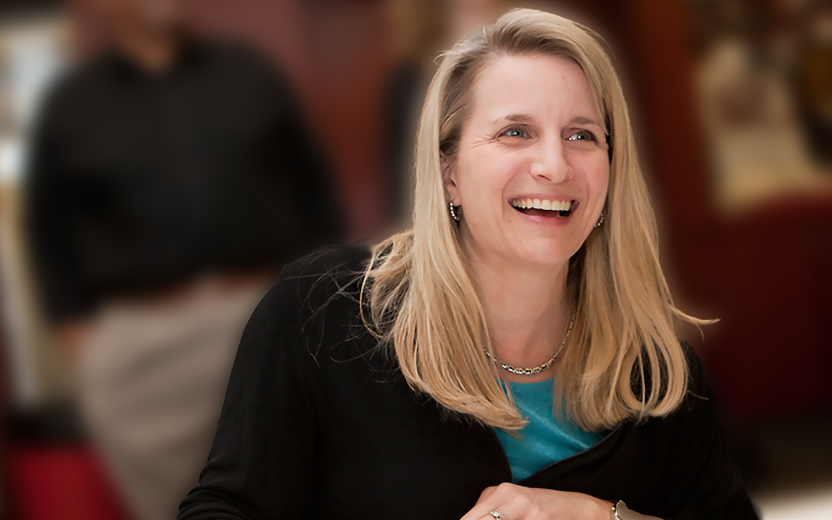Staff Stories: Andrea Haenlin-Mott

Building a better belonging
by Grace DePaull
When Andrea Haenlin-Mott first arrived at Cornell in 1995, many questioned why she chose to work at a university situated on a hill and home to buildings over 150 years old. As someone who uses a wheelchair full-time for mobility, Cornell presented many physical challenges to Haenlin-Mott, and it was clear that tremendous work needed to be done to create a physically safe environment and community where individuals with disabilities feel as though they belong.
Since her arrival, Haenlin-Mott has had a hand in many of the changes Cornell has experienced to advance the physical accessibility of spaces on campus. Currently, as the ADA coordinator for Facilities and Campus Services at Cornell, Haenlin-Mott is responsible for reviewing new plans for construction and renovation projects across campus and facilitating initiatives that increase the physical accessibility of the university.
“My role was created to look at disability accessibility more holistically instead of just focusing on employee and student accommodations. What I love about my job is that we’re actually making changes that impact the lives of our students, staff, faculty and visitors to the university,” Haenlin-Mott said.
In her role, Haenlin-Mott has initiated many projects that have helped alleviate some of the anxiety and difficulties surrounding the use and navigation of buildings and spaces on campus—one of which is the installation of more single-use restrooms, which has helped to remove some of the challenges people may face surrounding inaccessible and gendered restrooms.
“When I first started at the university, we needed to make modifications to the building I worked in so that I could go to the bathroom,” Haenlin-Mott said. “We turned a men’s bathroom into a single-user restroom. In the past several years, we’ve focused on the inclusion aspect that comes with making these physical and programmatic changes to spaces. It’s important to consider the impact and the lives of the people who use these buildings.”
According to Haenlin-Mott, while much of Cornell’s campus has progressed in the physical accessibility of spaces - with an increase in accessible transportation, parking lots and even digital content and resources - what has remained a challenge is the willingness to understand the intricacies of accessibility as an entire community.
“When we talk about disability and inclusion, it’s got to extend beyond awareness,” Haenlin-Mott said. “We need to feel as though we belong. We can have ramps and accessible parking spaces, but people need to feel that what they have to contribute actually matters. It goes much further than physical accessibility, and that is where we all have room to grow.”
Haenlin-Mott’s efforts go beyond ADA compliance and facility improvements to advocating for the disability community to contribute to the university’s progress broadly across all activities.
“I’m a problem solver,” Haenlin-Mott said. “That’s how I live my life. I probably solve five problems before I even get to work: getting up, dressed, showering, going in and out of my car and trying to navigate the world."
"Hearing from people with different outlooks makes us all think better and bring a richer perspective to Cornell.”
While October is National Disability Employment Awareness Month, Haenlin-Mott continues to work year-round to ensure that Cornell is a welcoming space that integrates a sense of belonging within the university’s physical spaces as well as functions and framework.
“It’s important to keep talking about accessibility and the issues surrounding it,” Haenlin-Mott said. “Accessibility is not just a challenge for the disability community—it’s the responsibility of our entire community as a whole.”
